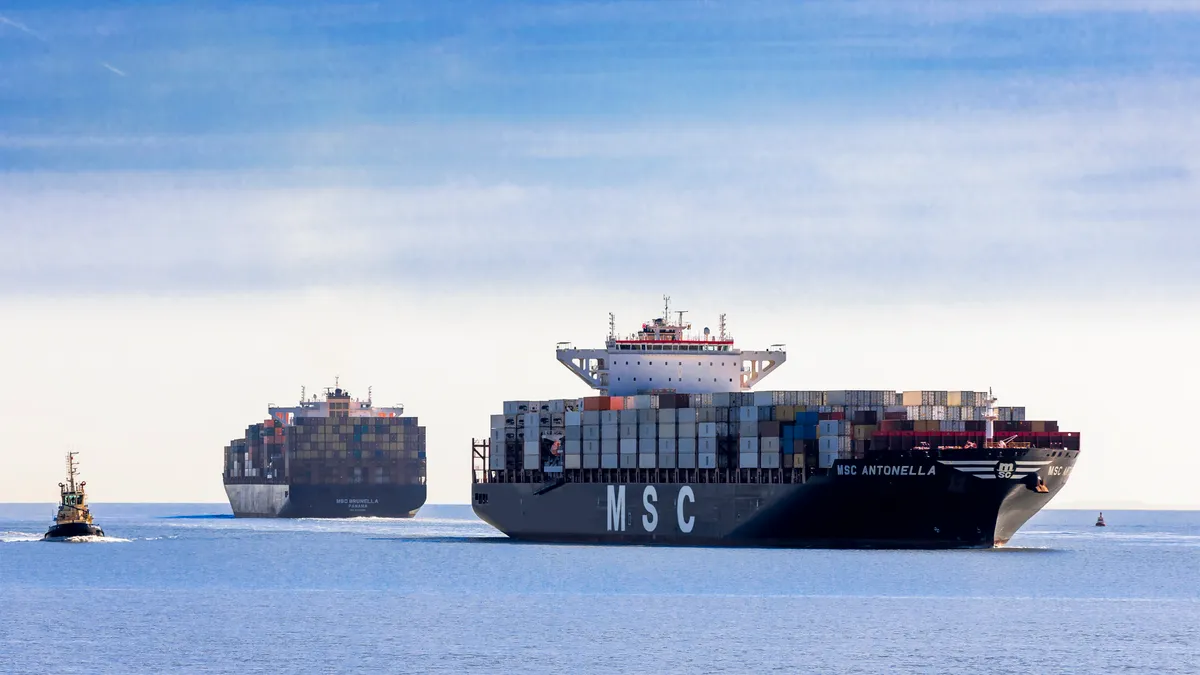Dive Brief:
- MSC is rolling out a Carbon Neutral Programme that gives shippers the option to offset carbon emissions produced in transit by investing in clean energy and environmental protection programs chosen by MSC and its partner South Pole, a climate solutions provider, according to a company announcement Tuesday. The program initially launched in a limited pilot phase in early 2019.
- When shippers choose this option, South Pole assesses the carbon footprint of a shipment and verifies the amount of emissions offset by financial support for its current projects, a hydropower plant in China and a rainforest protection program in Zimbabwe.
- In addition to supporting the environmental programs themselves, shippers' contributions will support "wider sustainable development in local communities," in line with the United Nations Sustainable Development Goals and the Paris Agreement, according to the release.
Dive Insight:
The ocean shipping industry has long been under pressure to decarbonize as consumers and international organizations recognize the environmental impact of marine freight operations. In line with the International Maritime Organization's (IMO) 2020 ruling, major carriers have been switching to low-sulfur fuels and more efficient ship designs to cut emissions 40% by 2030.
In the past year, MSC has completed the launch of its Gülsün Class vessels, which produce the lowest amount of carbon emissions per container across its fleet, and has signed the Ocean Conservancy's Arctic Shipping Pledge, thereby confirming it will no longer ship cargo on the environmentally vulnerable route.
In addition, it is exploring the use of biofuel after completing a pilot program in 2019. The company is looking "forward to now using [30%] biofuel on our vessels as a routine matter," Bud Darr, EVP of maritime policy and government affairs at MSC Group, said in a statement. The fuel could reduce carbon emissions by 15%-20% in the near term and could reach 80%-90% as technology improves and the fuel can be scaled up, Darr said.
MSC's efforts have reduced its overall carbon emissions by 13% between 2015 and 2018, according to the company's most recent report.
Maersk and Hapag-Lloyd have taken similar measures, reaching IMO 2020 targets a decade ahead of schedule in April. Hapag-Lloyd plans to cut emissions by another 20% over the course of 2020 and Maersk reported it remains on track for fully carbon-neutral operations by 2050.
As shippers work to reduce their supply chains' carbon footprint, working with carriers that are also trying to decarbonize their transport options can speed this process. In 2019, 70 shippers, maritime carriers and energy providers formed the Getting to Zero Coalition.
The group's goal is to cut emissions 50% by 2050 compared to 2008 levels by bringing together various streams of work on alternative fuels, including biofuels such as LEO, and zero-emission vessel designs to better implement environmental solutions at scale.
However, purchasing carbon offsets does not always reduce carbon emissions as advertised. For example, a ProPublica investigation last year found that corporations' reliance on offsets could, at times, provide a false sense of security about their current practices, potentially leading to the production of more emissions than carbon credit programs could reliably offset.
MSC's carbon credit program is assessed according to three standards from independent third-party organizations and metrics: Verified Carbon Standard; the Climate, Community and Biodiversity Standards; and the Social Carbon standard.














